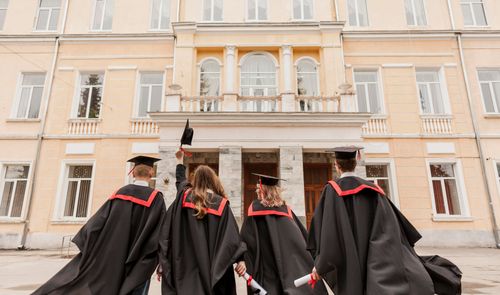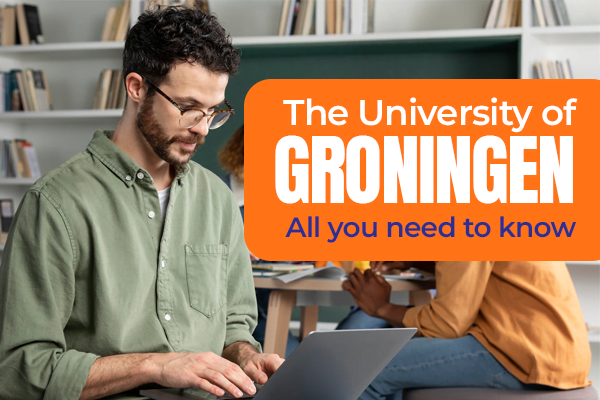Table of Contents
The University of Groningen provides approximately 180 bachelor’s and master’s degree programs. Students are provided with excellent supervision and well-rounded education. They are also provided with a range of electives, minor programs, exchange possibilities, and more. Students from all over the world come to Groningen to study and prepare for their future careers.
Why the University of Groningen?
- Firstly, the University of Groningen is one of Europe’s premier academic research institutions, with a reputation for producing high-quality research.
- They are effective because they employ fundamental academic research to find new ways to tackle social and individual challenges.
- The researchers at UG collaborate with academics from all around the world. The professors and lecturers actively involve the students in research. Professor Ben Feringa, from the Faculty of Science and Engineering, for instance, received the Nobel Prize in Chemistry five years ago.
- With 9,000 students from 127 nations, the institution now has a quarter of its student body formed by international students.
- This variety is increasing every year. It means you will have an international experience by sharing your classroom with individuals from all over the globe. In addition, you also have the chance to go abroad through the university’s many international exchange relationships.
- Several Master’s degree programs at the University of Groningen collaborate with other European universities. The Dutch are among the best non-native English speakers globally; hence communication is not an issue.
- Groningen is a beautiful and incredibly popular student city. Moreover, with the youngest population in the Netherlands and a quarter of the people being students, the city brims with life.
- You will see students everywhere in the city, whether studying at a café or a library, riding to class, or hanging out with friends in the park. You might also see them working a part-time job or taking advantage of the active nightlife.
Degree programs at the University of Groningen

Bachelor’s programs
Over 35 English-taught Bachelor’s degree programs are available at the University of Groningen, structured into 11 faculties.
Bachelor’s degree programs
| List 1 | List 2 | List 3 |
| American Studies Academic Training Primary School Teacher | Dutch Language and Culture | Tax Law |
| American Studies | Econometrics and Operations Research | Liberal Arts and Sciences |
| Applied Mathematics | Economics and Business Economics | Life Science and Technology |
| Applied Physics | English Language and Culture | Linguistics |
| Archaeology | European Languages and Cultures | Mathematics |
| Art History | Global Responsibility and Leadership | Media Studies |
| Artificial Intelligence | History | Medicine |
| Arts, Culture, and Media | Human Geography and Planning | Middle Eastern Studies |
| Biology | Human Movement Sciences | Minorities & Multilingualism |
| Biomedical Engineering | Industrial Engineering and Management | Notarial Law |
| Business Administration | Information Science | Pedagogical Sciences |
| Chemical Engineering | Global European Law | Pharmacy |
| Chemistry | Business | Physics and Philosophy |
| Classics | Global Relations and International Organization | Psychology |
| Communication and Information Studies | Dutch Law | Religious Studies |
| Computing Science | Internationaal en Europees Recht | Sociology |
| Data Science and Society | Law and ICT | Spatial Planning and Design |
| Dentistry | Law and Public Administration | Theology |
Master’s programs

The University of Groningen was named by Keuzegids, an independent Dutch consumer guide, as the “Best General University for Pursuing a Master’s degree in the Netherlands” in 2018. Moreover, it offers approximately 120 English-taught master’s programs.
Master’s degree programs
| List 1 | List 2 | List 3 |
| Accountancy and Controlling | Educational Sciences | Nanoscience |
| Applied Mathematics | Energy and Climate Law | North American Studies |
| Computational Mathematics | Energy and Environmental Sciences | Notarial Law |
| Applied Physics | Environmental and Infrastructure Planning | Pedagogical Sciences |
| Archaeology | European Law in a Global Context | Pharmacy |
| Artificial Intelligence | European Studies | Philosophy |
| Arts and Culture | Finance | Politics, Philosophy, and Economics |
| Art History | Global Criminal Law | Physics |
| Astronomy | Governance Law in Digital Society | Population Studies |
| Biology | History | DDM Social Demography |
| Behavioral and Cognitive Neurosciences | Human Movement Sciences | DDM Demography and Social Inequality |
| Behavioral and Social Sciences | Human Resource Management | Psychology |
| Biomedical Engineering | Industrial Engineering and Management | Public International Law |
| Biomedical Sciences | Language and Culture Education | Real Estate Studies |
| Biomolecular Sciences | Law and IT | Research Master in Economics and Business |
| Business Administration | Law and Public Administration | Science Education and Communication |
| Chemical Engineering | Learning in Interaction | Society, Sustainability, and Planning |
| Chemistry | Legal Research (Research) | Sociology |
| Chemical Biology | Linguistics | Spatial Sciences (Research) |
| Classics and Ancient Civilizations | Linguistics (Research) | Sport Sciences |
| Climate Adaptation Governance | Literary Studies | Supply Chain Management |
| Clinical and Psychosocial Epidemiology (Research) | Marine Biology (Selective) | Sustainable Entrepreneurship |
| Communication and Information Sciences | Science, Business, and Policy | Tax Law |
| Computational Cognitive Science | Marketing | Technology and Operations Management |
| Computing Science | Mathematics | Theology and Religious Studies (Research) |
| Dentistry | Mechanical Engineering | Tourism, Geography, and Planning |
| Dutch Law | Media Studies | Voice Technology |
| Dutch Studies | Molecular Medicine and Innovative Treatment | Water Technology |
| Ecology and Evolution | Medical Pharmaceutical Sciences | |
| Economic Development and Globalization | Medicine | |
| Economics & Business | Middle Eastern Studies |
Some of the fascinating International subjects include
- Business and Management
- Commercial Law
- Financial Management
- Human Rights Law
- Public Relations
- Global Relations (120EC)
- International Relations (Research)
- Modern History and International Relations (Research)
Key takeaways
- To sum up, the University of Groningen now offers approximately 120 English-taught Master’s and 30+ Bachelor’s degrees. Moreover, 18 are regarded as “Top Rated Programs” in the Netherlands.
- For instance, you can choose from 180+ top regarded bachelor’s, master’s, and doctoral degree programs provided by 11 faculties. Moreover, you can join a student body of over 35,000 students from over 120 nations.
- Engage in valuable and socio-culturally significant research to kick start a meaningful and successful career. You’ll feel entirely at home studying and living in the vibrant and pleasant city of Groningen.
We hope you enjoyed reading this blog post. If you have any doubts, you can reach us here.
You can also share your thoughts by leaving a comment below.
Liked this blog? Read next: 12 best universities for Indian students who plan to study abroad.
FAQs
Q1. What is the University of Groningen ranking in the world?
Answer – The University of Groningen is ranked 128th of almost 900 universities globally in the 2022 edition of the QS World University rankings. The University of Groningen has 17 ‘Top 100’ spots in the subject rankings.
Q2. Is Groningen University a research university?
Answer – In terms of academic research, the University of Groningen ranks among the best in Europe. They are effective because they employ core academic research to address societal and individual issues in novel ways.
Q3. Is studying in the Netherlands a good option?
Answer – Universities in the Netherlands are regarded as among the finest in the world. In addition, it is the best non-native English-speaking nation where you can study abroad and receive a high-quality education.






